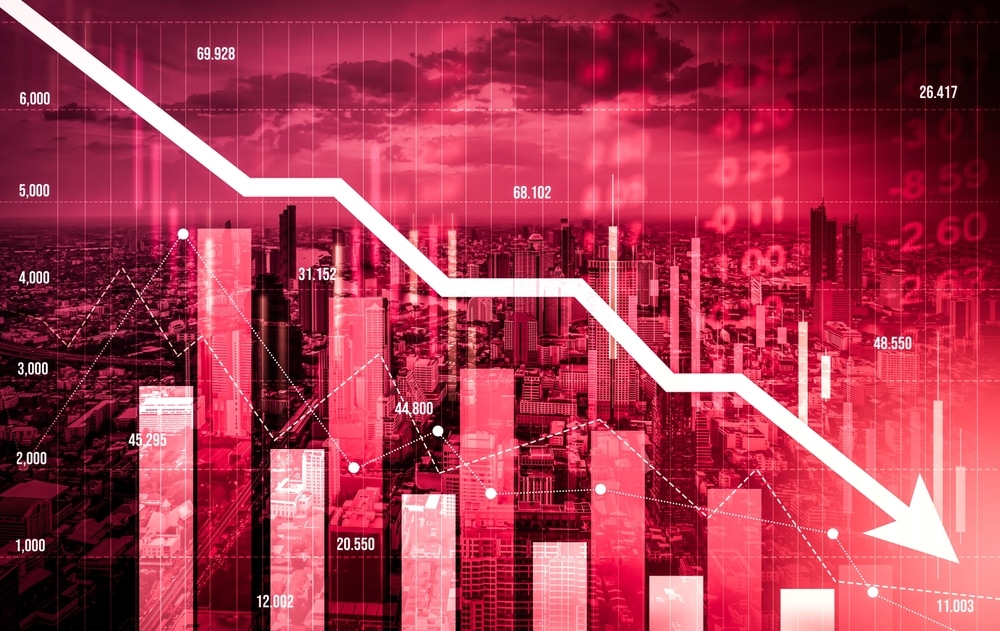
Global Market Rout Intensifies as Japan’s Nikkei Index Visits Bear Market Territory
The crypto market suffered the single largest drop on Sunday since April 13 as the broader stock market, and Japan witnessed an equity rout.
The crypto market tumbled to the lowest levels in over five months coincidentally as Japan’s equity market confronted recessionary fears days after the country’s central bank imposed a rate hike.
Bitcoin and Ethereum, the two leading cryptos by market value, fell considerably at 10% and 19% over the past 24 hours per CoinGecko data, respectively. Sunday trading volumes surged above 214% relative to Saturday, fueled by mass dip buying with market activity averaging 226%, crypto exchange Swyftx disclosed.
Bitcoin (BTC), Ethereum (ETH), and Solana (SOL) dominated the unusual market activity levels, accounting for 67% by late Sunday. In particular, Bitcoin buys were threefold, with a 2:1 buy-to-sell ratio observed for Ethereum. Large-cap cryptos, except stablecoins, have a 6% -20%
decline range, CoinGecko data shows.
Recessionary Fears Drive Sell-Off in Japan
Bullish Capital’s Sylvia To attributes recessionary fears as driving the huge sell-off within the US stock markets. The director at Bullish’s venture capital arm indicates that the downtrend spread to crypto, leaving investors to embrace traditional safe-haven assets.
Sunday’s drop represents the largest plunge since April 13, when the broader market faced an equity rout as investors holding tech stocks in the US and abroad freaked out.
To point out that the US unemployment rate spiked by 0.2% to 4.3% in June. The increase sparks concern about a slowing labor market, triggering fears that have engulfed the Nikkei 225.
The Tokyo Stock Price Index (Topix) dipped by over 7%, matching the Nikkei 225 stock index in the morning trading. Bloomberg publication notes the tumble extended the indexes’ losses to 20% since the July 11 peaks, suggesting a bear market.
The Topix tracks the performance of all listed companies on the Tokyo Stock Exchange (TSE). The steep decline in the Topix triggered the circuit breaker, halting trade on the market for 10 minutes, per a Bloomberg report.
The benchmarks appear destined for the worst three-day drop since the widespread tumble witnessed during the Fukushima nuclear and 2011 tsunami nuclear disaster.
Billion-Dollar Liquidation
Market observers attribute the decline to the Bank of Japan’s (BOJ) move to raise the benchmark interest rate from 0% – 0.1 % in July to 0.25%. Such represents the highest rates witnessed since 2008 as the Asia country ditches the decade-long policy for sustained near-zero interest rates.
The rate hike is reportedly a constituent of the broader move to tighten monetary policy. Such features reduced the acquisition of Japanese government bonds.
The resulting uncertainty creates skeptcims among the domestic traders with shipping costs of exports rising ahead of potential economic tightening.
The early morning trade saw Nikkei slip by 7.1% to push the losses above 21% since the onset of July. Market observes anticipate the index is visit bear market territory at 20% pullback from recent peak.
Friday market activity saw Nikkei close down 5.8% to register the largest daily decline since March 2020. The traders appear visibility upset about stronger yen impact on the Japanese companies with BoJ mulling further rate hikes.
The broader Asian stock market replicated the sharp drop on Wall Steet fueled by disappointing jobs data triggering fears of weakening US economy. The Dow lost 1.5%, the S&P 500 1.8% lower and the Nasdaq Composite down 2.4%. The Nasdaq closed Friday activity within the correction territory surpassing 10% off from July 10 peak.
The market is diving when several tailwinds converge particularly the close race in the US presidential elections and rising tensions within the Middle East. The past 24 hours has seen the crypto market suffer $1.1 billion liquidations with the larger wipeout arising from bets on higher prices, according to CoinGlass data. To considers such as cautious uptake of risk assets among investors. With $964.83 million liquidation from long positions, investors could be seeking safe-havent assets such as bonds amid fears of looming headwind.




